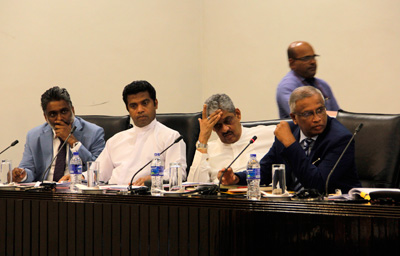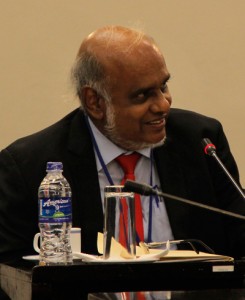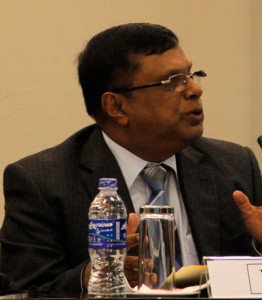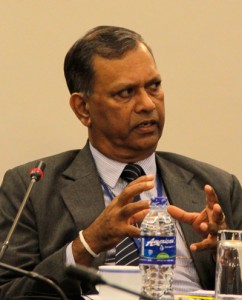News
State Intelligence Service must be independent by Act of Parliament
Police failed to act on Intelligence in the days leading up to the attacks; Officers falsified log entries to cover their tracks
The 3-member Committee appointed by President Maithripala Sirisena to look into lapses in the lead-up to the Easter Sunday bombings, gave evidence this week before the Parliamentary Select Committee (PSC) probing the same attacks.

Pix by Sameera Weerasekera
The Presidential Committee, comprising Supreme Court Justice Vijith Malalgoda (Chairman), former Inspector General of Police (IGP) N.K. Illangakoon and former Ministry Secretary Padmasiri Jayamanne, appeared before the PSC together to give evidence. Much of the evidence was given by Justice Malalgoda in his capacity as Committee Chairman.
In its evidence, the Committee revealed it had observed “glaring lapses” on the part of the police, in the days leading up to the attacks, adding that, some officers had gone to the extent of falsifying log entries to cover their tracks. The Committee said it had recommended that investigations be launched against the officers responsible.
The Committee also said it had recommended that the State Intelligence Service (SIS) be reformed as an independent Intelligence agency through an Act of Parliament.
Following are highlights of the evidence given by the Committee-
Justice Vijith Malalgoda:
The President appointed our Committee on April 22, 2019, one day after the Easter Sunday attacks. I am here today, not in my capacity as a Justice of the Supreme Court but, as a member of this Committee to explain what we did.
We undertook this duty in the national interest. We were not conferred with powers under the Presidential Commission of Inquiry Act, and were simply, a fact-finding mission. We were initially given only two weeks to complete our inquiry and submit a report. However, as that was insufficient, we obtained a further 3 weeks to complete our inquiry. During the 5-week period of our inquiry, we recorded evidence from about 60 witnesses.
There was no clear criteria for us on how to operate. We had to take our own decisions on how to proceed. We started recording evidence from witnesses on April 25. As such, we were able to obtain statements from some of those connected to the incident, almost immediately. We completed our final report and handed it over on June 10.
During our questioning of some police officers, we observed there were some glaring lapses. We have stated this in our observations and recommended that the conduct of these officers be investigated. We continued to maintain that position in the initial letter we submitted to the President after one week, in our interim report as well as the final report.

Padmasiri Jayamanne

Justice Vijith Malalgoda

Former IGP Illangakoon
Regarding lapses, for example, the Western Province Senior DIG had prepared a letter based on the note sent by the IGP (regarding an impending attack) that had been marked FNA (For Necessary Action). However, that letter only reached the Foreshore Police, which is the area police station in Kochchikade, at 4 pm on the day of the attack. The OIC of the Foreshore Police only saw the letter when he came back to the station that evening, after being at the scene of the Kochchikade bomb blast. A letter did reach the Katana Police on April 13, but the OIC had not taken it up until April 20.
In Kochchikade, we couldn’t find any police officers near the scene. But, on going through the logs, there were 21 officers who were supposed to be on duty that day- both in uniform and in civvies. When we went through the books, we found that all the entries had been altered to state they had been at a meeting at 6 am, and then gone to Kochchikade. But the meeting had been held at 8.50 am. By that time, the explosion had already occurred.
The Eastern Province Senior DIG did not know anything. He claimed his entire area was extremely peaceful. It was astonishing for us to hear such a statement from such a senior officer. We included his statement as an annexure in our final report, to point out that these were the kind of officers who were in charge.
We identified officers from the highest levels down to the bottom and recommended action against all of them.
We also observed that intelligence had not been disseminated properly. In order to avoid a repeat of such an occurence, we recommended that the SIS should be restructured as an independent body, through an Act of Parliament. The SIS should function differently to that of other Intelligence agencies, such as those of the Army.
Even if we are to buy the argument, that the Intelligence information received on April 9 was unverified, the Kattankudy explosion happened on April 16. The police were informed of it on the evening of April 17. By evening of April 18, they had traced all those responsible for the act. If you look at the list of the names of suspects that were received on April 18, you would see that the names of the attackers were also there. Why did they not act then? This shows a clear lapse on the part of those responsible.
We had to write one entire chapter on the events from April 9-20, detailing the information received and the inaction of those responsible.
Former IGP N. K. Illangakoon:
We submitted recommendations on the restructuring of Intelligence agencies. There are many Intelligence agencies. But we observed lapses in coordination among them. As such, for the purpose of national security, we recommended that a strong, independent body, covered by Legal provisions, be established through an Act of Parliament.
There were clear lapses in disseminating information within the police. We did not find any of the reasons given by officers responsible, for these lapses to be acceptable.
The Intelligence mechanism that was in place seemed to be centered on individuals. Meaning, its success depended on the interest and competency of the Senior-most officers of the agency. That was one of the deficiencies we observed.
By the evening of April 20, there was specific Intelligence information regarding an attack the next day. There were some 16 hours for them to act, but the Intelligence was not acted upon.
The PSC comprises Deputy Speaker Ananda Kumarasiri (Chairman), Rauff Hakeem, Ravi Karunanayake, Dr Rajitha Senaratne, Dr Jayampathy Wickramaratne, Prof. Ashu Marasinghe, Field Marshal Sarath Fonseka, M.A. Sumanthiran and Dr Nalinda Jayathissa.

